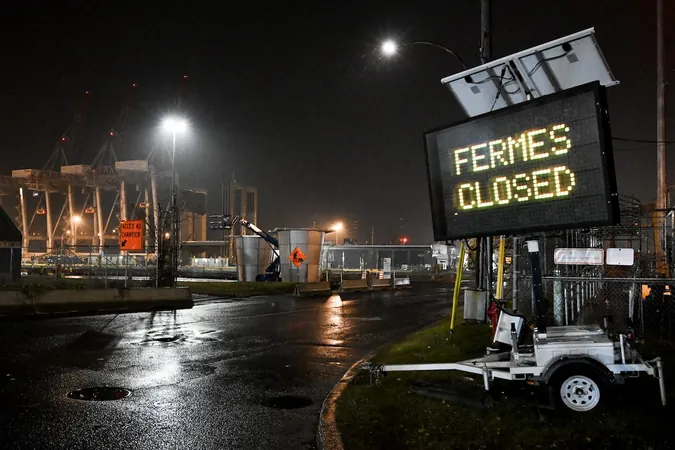
Canada’s Major Ports in Crisis: Workers Locked Out as Contract Negotiations Fail
2024-11-11
Author: Emily
Overview of the Situation
In a dramatic escalation of labor disputes, dock workers at Canada’s two largest ports are facing lockouts that threaten to cripple the nation’s supply chain. This situation unfolded after the longshore employees in Montreal overwhelmingly rejected a contract offer from the Maritime Employers Association late Sunday night. Meanwhile, the dock workers at ports in British Columbia, including the bustling Vancouver port, have been locked out since last week.
Montreal Dock Workers' Stand
About 1,200 Montreal dock workers, represented by the Canadian Union of Public Employees (CUPE), turned down an employer proposal that offered incremental salary increases of 20% over a six-year period. The workers are demanding a more favorable agreement that mirrors a 20% raise implemented for their counterparts in Vancouver and Halifax over four years. CUPE spokesman Michel Murray expressed frustration, stating, 'The hostile offer was rejected because the employer refused to negotiate. Nothing in the offer reflects the union’s demands.'
Employer and Government Response
In light of the continued deadlock, the employers group has called on the federal Minister of Labour, Steven MacKinnon, to step in and mediate the situation. Adding urgency to the matter, Julie Gascon, CEO of the Montreal Port Authority, warned of the devastating implications should the standstill continue. 'Today, the conflict is hitting the supply chain. Tomorrow, it will hit the factories, and after that, retailers. It will affect the entire economy of Eastern Canada,' she cautioned.
Broader Economic Impact
The ramifications of the dispute extend far beyond the port workers themselves. Gascon pointed out that another 10,000 workers who rely on the Port of Montreal’s activities – including truck drivers and railway personnel – are also being impacted. The effects are expected to ripple through the economy within days.
Diminishing Container Traffic
As shipping lines have started redirecting vessels to U.S. ports, such as those in New York and Norfolk, Montreal has experienced a staggering 24% decline in container traffic over the past two years, with an accelerated drop since January. Gascon noted, 'The longer this conflict continues, the more we approach a day where shipping lines may eliminate Canada as a reliable destination in North America. Our reputations, north and south, are at stake.'
Port Operations Amid Crisis
The economic implications are considerable, as the Port of Montreal is responsible for nearly $400 million in goods being moved daily. Even amidst this turmoil, the Port plans to maintain operation of three terminal areas: the Bickerdike terminal, liquid bulk terminals, and grain terminal, in case of an extended lockout.
British Columbia Labor Situation
For the dockworkers in British Columbia, negotiations have also stalled as discussions were called off following a lack of progress. The B.C. Maritime Employers Association cited insufficient advancements in meetings with federal mediators as the reason for this setback. Comprising over 700 supervisors across key ports, the International Longshore and Warehouse Union’s members are now uncertain about their future.
Railway and Export Concerns
Adding to the mounting chaos, Canada’s major railways have ceased accepting trucks and trains bearing export containers, intensifying concerns about the supply chain’s reliability. Jonathan Abecassis, a spokesperson for Canadian National Railway, highlighted the significant impact of the ongoing unrest.
Strikes and Labor Disruptions
With numerous strikes and labor disruptions affecting various sectors this year, including a short strike from WestJet mechanics, along with potential lockouts at major railways, both businesses and consumers are feeling the heat. Abecassis advocates for the federal government to urgently facilitate dialogue within the sector to avert similar crises going forward.
Conclusion
The unfolding narrative highlights a precarious moment for Canada’s economy, as prolonged labor disputes could further diminish its standing as a stable trade partner on the global stage. With businesses clamoring for the government to recognize supply chains as essential services and intervene, the stakes are higher than ever. As negotiations remain stalled amidst calls for action, one thing is crystal clear: the clock is ticking on finding a resolution before the full economic fallout is felt.









 Brasil (PT)
Brasil (PT)
 Canada (EN)
Canada (EN)
 Chile (ES)
Chile (ES)
 España (ES)
España (ES)
 France (FR)
France (FR)
 Hong Kong (EN)
Hong Kong (EN)
 Italia (IT)
Italia (IT)
 日本 (JA)
日本 (JA)
 Magyarország (HU)
Magyarország (HU)
 Norge (NO)
Norge (NO)
 Polska (PL)
Polska (PL)
 Schweiz (DE)
Schweiz (DE)
 Singapore (EN)
Singapore (EN)
 Sverige (SV)
Sverige (SV)
 Suomi (FI)
Suomi (FI)
 Türkiye (TR)
Türkiye (TR)